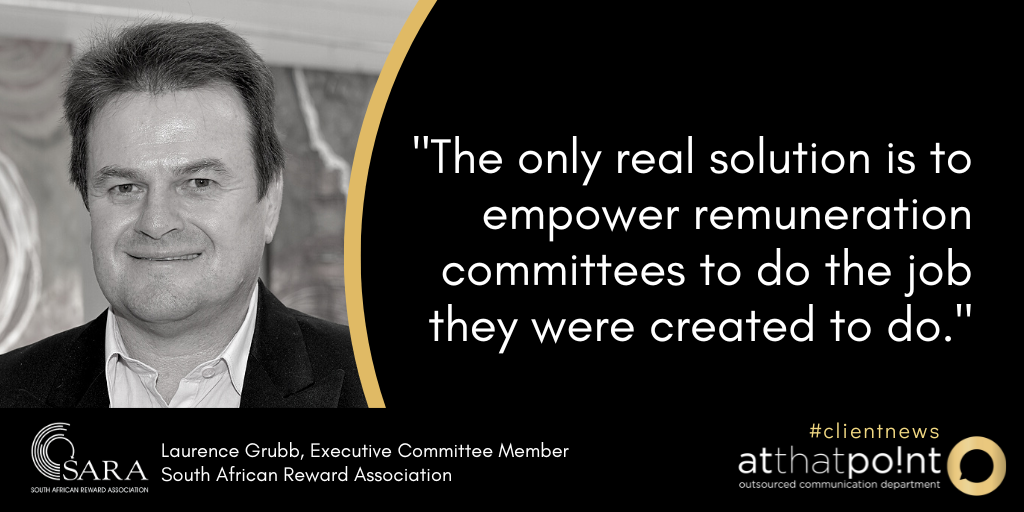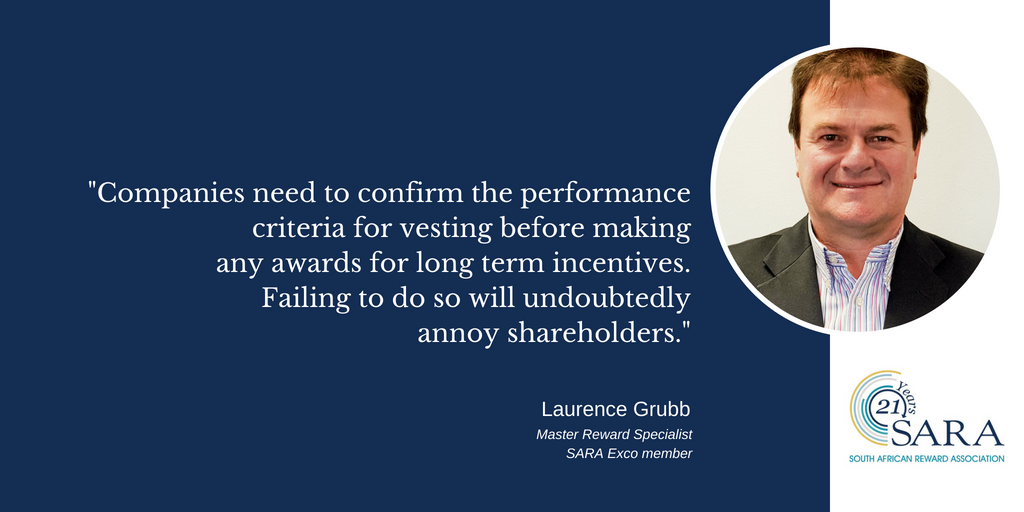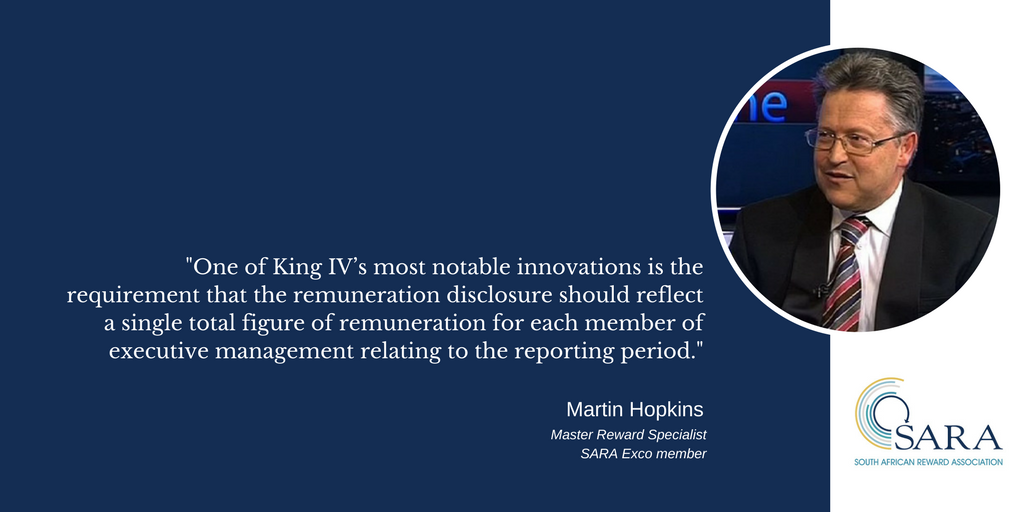 Stronger remuneration committees are the solution to rampant executive pay. This is according to Laurence Grubb, Master Reward Specialist and Executive Committee Member at the South African Reward Association (SARA). "We're seeing an imbalanced power dynamic between high-performing executives who associate significant rewards with the value they deliver and RemCos with structural expertise gaps that cannot assertively counter their demands," he says. Grubb suggests that alternative remedies are likely to do more harm than good. The danger of a binding vote The majority of South African businesses try to abide by the King IVTM code of corporate governance to achieve balanced and appropriate outcomes for executives, shareholders and other stakeholders. Yet, some CEOs, CFOs and executives continue to extract excessive remuneration from their companies. However, they have often built the enterprise from scratch or led it to significant growth, making them key to their company's success. So they may control the balance of power with a Board and Remco not willing to cross them. One suggested approach is to afford shareholders a binding vote that could deny gratuitous executive rewards, but Grubb says this is risky. "These leaders are the drivers of the business's growth and if their expectations are not met, they could move on and leave the Board to find a suitable successor, the impact of which will normally be a decline in the share price" says Grubb, noting that similar scarce talent might be impossible to find. Consequently, shareholders may end up shooting themselves in the foot. Rethinking the RemCo A better solution is to equip the RemCo with the necessary expertise to rationalise, negotiate and even restructure proposed packages in a way that satisfies of all parties. This requires that the committee augments its competencies with a deeper knowledge of current remuneration trends, industry standards and competitive best practices. To facilitate this solution, SARA is developing masterclass webinars and live sessions aimed at RemCo members, as well as other executive and non-executive directors, to enhance their understanding of executive remuneration. In addition, King IV suggests that the committee invites an external advisor to guide it in its duties. Executives will often hire remuneration consultants to help them determine the highest reward opportunities for their position. Their justification for greater compensation will be informed by data, industry benchmarks and practices and broader insights. RemCos without similar independent expertise will be left at a disadvantage. "In an ideal world, King IV might recommend a Master Reward Specialist as a standing member in all RemCos, allowing them to bring remuneration expertise, independent views and industry best practices to the negotiation," says Grubb. A real solution While most South African businesses have roped in runaway executive earnings, some executives continue to enjoy astronomical rewards. Many proposed solutions – like more onerous regulations or a binding vote for shareholders – may have unintended consequences which would prove to be negative in the long run. "The only real solution is to empower remuneration committees to do the job they were created to do," says Grubb. Most of all, they must be able to challenge the CEOs and executives who, up to now in some companies, have retained the balance of power in their struggle for greater rewards. ENDS MEDIA CONTACT: Rosa-Mari Le Roux, [email protected], 060 995 6277, www.atthatpoint.co.za For more information on SARA please visit: Website: www.sara.co.za Twitter: @SA_reward LinkedIn: South African Reward Association Facebook: SARA – South African Reward Association
0 Comments
Whether or not executives earn too much and, if so, how to address executive remuneration practices, are two questions that continue to nag at global society.
“The pressure is even greater in South Africa, where inequality, poverty and unemployment are more pronounced,” says Martin Hopkins, Master Reward Specialist and past president of the South African Reward Association (SARA). The King IV Report on Corporate GovernanceTM recommends several approaches to governing executive reward. One is to give investors a greater say through remuneration voting. But what is it and what material effect does such a vote offer? What remuneration voting means King IV calls for executive remuneration in each company to be disclosed to investors through a remuneration report that has three parts: a background statement, an overview of the remuneration policy, and an implementation report. Further, shareholders are given the opportunity to pass a separate non-binding advisory vote on the policy and the implementation report. If 25% or more of the voting rights exercised by shareholders are against the remuneration policy or the implementation report, or both, the remuneration policy should specify the measures committed to by the board to respond to this voting outcome. These measures should include investor engagement and addressing objections and concerns, although King IV does not specify what format they should take or how they should be implemented. King IV is not enforceable by law; it is simply presented as a framework for good corporate governance. However, its influence is “given teeth” when its recommendations are adopted by regulators with the power to enforce them. This is true of the Johannesburg Stock Exchange (JSE) Listing Requirements, which makes certain of its practices mandatory for publicly traded companies. So, within the JSE's purview, remuneration voting is compulsory, not optional. Even so, a non-binding advisory vote by shareholders has no legal effect on the adoption of the remuneration policy or the implementation report. It simply allows the organisation's management and remuneration committee to gauge sentiment towards their provisions. That said, the vote serves as a powerful barometer of the company’s governance quality and of investor confidence. Should shareholders have more power? The effect of giving shareholders more say in how much executives earn is widely debated. They have a strong economic interest in good governance as well as a moral obligation towards equitable pay. At the same time, giving investors too much power may unduly affect the ability of the Board to govern and management to operate the company effectively. Investor activism can be a powerful force for good, but ultimately the directors need to balance the needs of many stakeholders and make balanced decisions that are overly influenced by any single voice. Measures to provide for increased shareholder power are currently being debated by various interest groups, with measures such as a binding vote on the remuneration policy and/or the implementation report and the so-called “two strike” rule being considered. The binding vote means that the directors must adhere to the provisions of the approved policy and may not apply their discretion to vary the policy terms without shareholder approval. The “two-strike” rule would mean that in the case of two successive votes of more than 25% against the remuneration policy or implementation report the members of the Remuneration Committee would have to step down from the committee for at least two years, and be replaced by other members of the Board. There is diverse practice on remuneration voting in developed and developing countries, with a binding vote on the remuneration policy at a 50% threshold in place in the UK, which is viewed as being reasonably effective, and non-binding voting practices in the US and Canada. Australia has adopted the “two-strike rule” with limited success. Reward perspective Hopkins notes that while there is a great deal of emotion regarding executive pay it's also important to recognise that it is not at all clear that executive pay can be dramatically reduced without damage to the ability of business to generate shareholder value and create jobs. Market forces mean that any one company within a country can’t dramatically reduce executive pay without immediate loss of skills and leadership. If regulations in a country systemically reduce all executive pay then mobile highly skilled executives may well move to other countries which have no such regulations. Many companies aspire to pay their executives in line with their contribution to business profitability and reward them against agreed performance milestones. King IV was developed to reign in excessive remuneration practices, not prevent companies from fairly rewarding employees for their contribution and performance. “Organisations should also look at the other end of the pay fairness equation, with increasing focus on the pay gap and how this should be measured and addressed”, says Hopkins. Together with caution in respect of executive pay, measures to increase the pay of the lowest paid staff, whilst remaining economically competitive is another important reward factor to consider. “This is a complex issue”, concludes Hopkins. Business leadership cannot disregard calls from many quarters to address these issues, but must also seek to balance the views of multiple stakeholders with the pressing need for economic growth and job creation. ENDS MEDIA CONTACT: Rosa-Mari Le Roux, 060 995 6277, [email protected], www.atthatpoint.co.za For more information on SARA please visit: Website: www.sara.co.za Twitter: @SA_reward LinkedIn: South African Reward Association Facebook: SARA – South African Reward Association Recent reports of shareholders voting against executive remuneration structures have again highlighted the need for increased transparency in the disclosure of not only the amounts paid, but how the amounts were calculated and the link to performance. Many companies have made significant progress with the disclosure of executive pay and the quality and content of remuneration policies and implementation reports.
However, the improved transparency of certain excessive executive pay packages has also fuelled the perception that all executives are paid exorbitant amounts of money, causing an ever increasing pay gap. Laurence Grubb, Master Reward Specialist and executive committee member of the South African Reward Association (SARA), says a handful of executives are still able to manipulate remuneration committees, despite notable efforts to follow the principles set out in King IV and the association’s guidelines. Committees agree to targets which are a little too soft or potential remuneration that is out of line with industry. “Although these executives are in the minority, it remains a concern and needs to be contained.” Independent advice needed Grubb says remuneration committees should be entitled to obtain independent advice from their own remuneration consultants to validate what has been presented to them by the executives. The cost for this service should be borne by the company. SARA published guidelines on the drafting of a remuneration policy and the implementation report at the beginning of the year which follows the principles set out in King IV. Some ‘old’ long term incentive schemes may have awards which were not linked to performance. Those shares may now be vesting, and with no performance linked to them, it is quite possible that shareholders will vote against such schemes. Grubb says companies need to confirm the performance criteria for vesting before making any awards for long term incentives. Failing to do so, will undoubtedly annoy shareholders. Barclays Africa experienced this first hand when shareholders voted against the company’s policy and implementation report earlier this month (May 2018). In terms of the King IV principle on remuneration, the policy should record the measures that the board commits to when 25% of the votes are exercised against either the remuneration policy or the implementation report, or both. These actions should then be communicated in the background statement in the following year. South Africa is the only country in which the threshold for these remedial measures is as low as 25%. In Australia, the UK and Belgium, among others, remedial measures are only mandated if 50% or more of the votes are cast against the remuneration policy and implementation report. Pay gap realities The pay gap in South Africa remains a burning issue, although companies have been trying to address it by offering larger annual increases for lower level workers and smaller increases at executive level. However, an increase of 5% on R2 million will always make a bigger gap than 8% on R100, 000. Several companies have also introduced the minimum wage, and in some instances, wages which exceed the minimum wage. In countries where the pay gap is much narrower, the level of skills, education and productivity of the lower end workers are much higher than in South Africa. Grubb says companies operating in those countries are typically able to pay much higher rates to their lower level employees because of the higher skills and productivity levels. “Unfortunately, in countries where education is severally limited and not at the right standard, the impact is felt mostly by those whose skills and level of education do not offer them the opportunity to increase their earning potential.” Companies find it difficult to continually pay higher salaries to lower levels and, inevitably where that does happen, there are job losses. The South African Reward Assocation (SARA) has launched A guide to the application of King IV™: Principle 14 - Governance of Remuneration. The guide was co-authored with the Institute of Directors in Southern Africa (IoDSA) and is intended to help reward specialists – as well as members of governing bodies and other stakeholders – better understand and apply the principles of King IV in regard to remuneration.
“Many reward specialists struggle with the practical application of the remuneration principles and recommendations of King IV,” says Martin Hopkins, Master Reward Specialist and Exco member of SARA. “A particular sticking point is the reporting of the organisation’s remuneration policy and the implementation report, especially given King IV’s emphasis on increased disclosure.” Hopkins joined his fellow SARA Exco members and Master Reward Specialists Morag Phillips and Laurence Grubb in launching the Guide at a breakfast attended by 150 reward professionals who are responsible for the design, development and implementation of reward strategies, policies and processes that will support organisational strategies. King IV is only applicable to integrated reports relating to financial years ending after 1 October 2017. The first King IV-compliant remuneration reports are only now being published. These reports will be the first examples for professionals to learn from. One of King IV’s most notable innovations is the requirement that the remuneration disclosure should reflect a single total figure of remuneration for each member of executive management relating to the reporting period. This single figure should encompass the salary, benefits, short-term and long-term incentives and any other remuneration elements. The values for the short and long term incentives should be reflective of the period of performance covered in the annual report and not necessarily of the time of payment. The idea being that the reader can relate the payments to the performance during that period. The single figure follows broadly the principle established in the United Kingdom, and now part of its company law. It is intended to make it much easier for stakeholders to establish what remuneration an individual received during the reporting period, and to compare this with performance. The single figure also makes it easier for readers to compare remuneration across reporting terms. A fundamental principle of single-figure disclosure is to identify when remuneration is received or receivable, in order to enable this comparison between remuneration and performance during a specific period. King IV also requires unvested awards to be reported, again in order to promote transparency and to give stakeholders a clear indication of future liabilities contingent on the performance targets being met. Establishing these values can be complex, says Hopkins, because many performance incentives have a number of variables, such as vesting dates and valuations, and may refer to share prices or other measures. The Guide details the principles informing how each of these elements should be disclosed. More broadly, the Guide contains detailed notes on each of the Recommended Practices relating to King IV’s Principle on remuneration (Principle 14). Remuneration is an important performance driver, but a remuneration policy that is unfair or is perceived to be unfair can negatively impact an organisation’s sustainability and it’s shareholder voting. King IV aims to provide a framework for achieving a fair and effective remuneration policy that can be defended convincingly. “However, it is a complex area and sufficient implementation will only be achieved over time and as the result of focused effort by the remuneration committee. This Guide is designed to provide practical help to achieve the outcomes envisaged by King IV.” The Guide is available at http://www.sara.co.za/sara/file%20storage/Documents/2017/Nov/KingIVGuide_ToTheApplicationOfRemunerationGovernance.pdfwww.sara.co.za/sara/file%20storage/Documents/2017/Nov/KingIVGuide_ToTheApplicationOfRemunerationGovernance.pdf ENDS MEDIA CONTACT: Juanita Vorster, 079 523 8374, [email protected], www.atthatpoint.co.za For more information on SARA please visit: Website: www.sara.co.za Twitter: @SA_reward LinkedIn: South African Reward Association Facebook: SARA – South African Reward Association |
Archives
March 2023
Welcome to the South African Reward Association newsroom.
Categories
All
|



 RSS Feed
RSS Feed